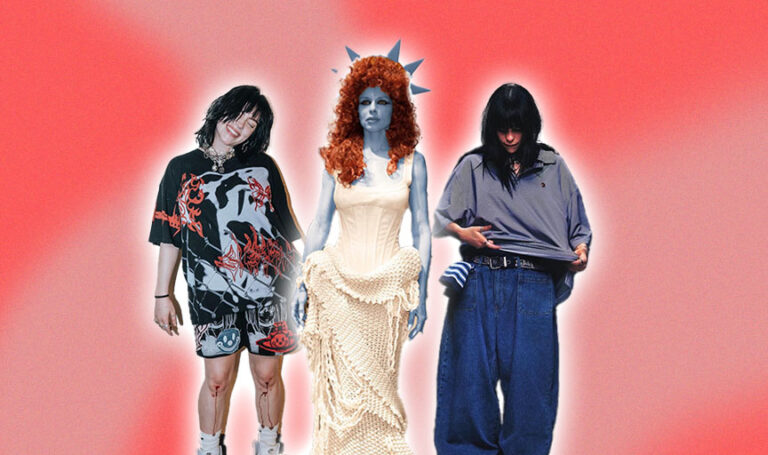How Gen Z women are using fashion to say f*ck you to the male gaze
At a time when women’s rights are being rolled back across the entire globe, Gen Z women are embracing anti-male gaze outfits that represent a fusion of self-expression and social defiance. Of course, there’s more to this fashion vibe shift than meets the eye. FYPs everywhere are seeing a surge in anti-male gaze outfits, sparking essential conversations on apps like TikTok and Instagram. This anti-fashion movement suggests that Gen Zers are ushering in a new style era, one that lets them dress in a way that feels true to them, without limit or discomfort.
In 1975, film critic Laura Mulvey coined the term “the male gaze” to describe the portrayal of women in the arts from the perspective of a male, heterosexual consumer. But Gen Zers are having none of this outdated attitude when it comes to getting dressed. In fact, many are embracing anti-male gaze outfits as a way to avoid objectification, adopting attire that covers and conceals to divert attention from their figures.
@theahallow Part 5 - Wearing this fit to my gig because l only want pretty womxn, gay, theys & thems at my shows Grilz from @London Grillz Top & jeans @Weekday Boots @CHARLES & KEITH Bag @TELFAR Jacket @asos #ootd #2024 #outfitinspo
♬ type shi - jaydenokokok
Arguably, no one does this better than musician and actor Billie Eilish, whose decision to exclusively wear oversized clothing works to shift the focus from her appearance to her talent. Gabriela Serpa Royo, senior cultural analyst at behavioural insights agency Canvas8, explained to SCREENSHOT that the rise of anti-male gaze outfits has come at a time when people have more power than major fashion houses do. This is upending typical consumer dynamics. “I don’t think that we could ever really say that before the era of viral user-generated content and TikTok micro trends. With that comes the potential to exert unprecedented influence on the fashion world to emancipate itself from the male gaze.”
When it comes to disregarding the male gaze, Julia Fox is another style icon whose statement-making wardrobe is centred around one sole principle: dressing how she wants and not caring how men perceive her. Speaking on a BBC Radio 4 Woman’s Hour podcast episode, Fox said: “Whether I was realising it or not, I think my appearance is very much to please the male gaze in a way. And then something happened, I don’t know if it was motherhood or being thrust into the public eye. And I was like, I don’t want to uphold this anymore.”
This move towards dressing for the female gaze or anti-male gaze, both terms that are flourishing on TikTok with over 33 million affiliated posts, serve as a reminder of the importance of fashion autonomy.
It also shows how Gen Z women are regaining a sense of control over their style. By gravitating towards baggy garments creators such as Thea Hallow, Coco Chinelo, and Destiny disrupt the conventional standards imposed by patriarchal fashion norms, asserting agency over their bodies and attire.
One TikTok video’s caption reads: “Anti-male gaze outfits for the girls, can’t have you getting knocked out in the streets now.”
@bianim_xoxo Anti-male gaze outfits for the girls, can’t have you getting knocked out in the streets now #springoutfitideas #outfitinspo #fashion
♬ Gorilla - Little Simz
“Women are intentionally wearing off-putting or modest clothing to avoid harassment in an enclosed space,” says Riani Kenyon, a behavioural analyst at Canvas8. “However, this is not to say that ‘women dress for men’ (which is often the assumption). Rather, they are dressing in reaction to men as a safety precaution, whether it’s psychological or physical safety,” the analyst continued. All of this is happening in a social climate where there is a global backlash against women’s rights worldwide, with a United Nations (UN) report finding that less than half of women surveyed believe they have real autonomy in decisions involving their bodies.
Gen Zers weren’t the first ones to participate in the concept of dressing in a way that rebels against the patriarchy. In 2010, Leandra Medine Cohen launched Man Repeller, a personal blog that evolved into an online magazine, which closed in 2020. During the peak of its reign, the millennial style promoted by Cohen was a blend of high fashion and quirky nerdiness—sparking conversations about who, and what, women are dressing for. It’s something that still sticks to this day, with man-repellent outfit inspo and videos titled ‘Man repelling since 2001’ garnering over 1 million views and counting.
@jewsonecstasy1234 Man repelling since 2001 #manrepeller #fashiontrends2023 #fashiontiktok #outfitideas
♬ original sound - Random Memes and Stuff
Gen Z is evolving and adding new dimensions to the man-repeller outfit concept, incorporating social media dynamics and contemporary issues. The zeitgeist would say that this movement is now less about male opinions, less about dressing in a restricted and confined way, and more about a broader cultural rejection of female objectification. It celebrates female agency and liberates women from seeking validation for their appearance.
“Fashion has always navigated a fine line when it comes to the male gaze,” says Serpa Royo. “As women popularise anti-male gaze outfits, they’re really sticking it to centuries’ worth of internalised norms. In many ways, choosing to dress against the male gaze is still chasing to dress against the status quo, and against normalised ideals of what is beautiful,” the expert continued.
Personal style is just that: personal. And with Gen Z women taking this sentiment to heart, dressing in a way that allows them to reclaim a sense of their identity when the world around them is instructing them otherwise, fashion’s future looks to be in safe hands. Serpa Royo adds: “Doing so requires more self-determination and bravery than people would readily admit.”






